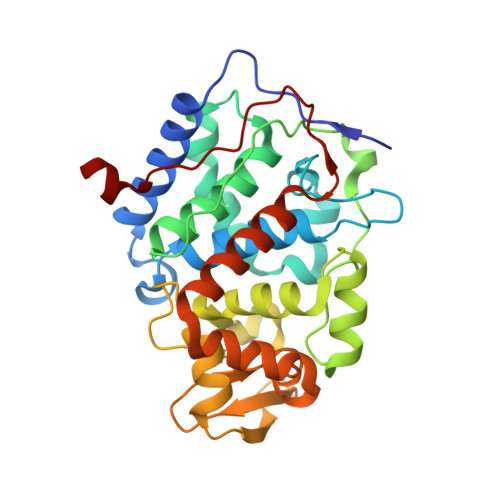Electrostatic control of the tryptophan radical in cytochrome c peroxidase.
Barrows, T.P., Bhaskar, B., Poulos, T.L.(2004) Biochemistry 43: 8826-8834
- PubMed: 15236591
- DOI: https://doi.org/10.1021/bi049531g
- Primary Citation of Related Structures:
1SOG, 1STQ - PubMed Abstract:
Previously a K(+)-binding site, analogous to that found in ascorbate peroxidase (APX), was engineered into cytochrome c peroxidase (CcP) to test the hypothesis that the bound K(+) influences the stability of the Trp191 cation radical formed during the CcP catalytic cycle (Bonagura et al., (1996) Biochemistry 35, 6107 and Bonagura et al., (1999) Biochemistry 38, 5528). Characterization of this mutant, designated CcPK2, showed that the stability of the Trp191 cation radical is dependent on the occupancy of the engineered K(+) site and that the Trp191 radical was much less stable in this mutant than in wild-type CcP. The mutations Met230Leu, Met231Gln, and Met172Ser have now been constructed on the CcPK2 mutant template to test if the Met residues also contribute to the stabilization of the Trp191 cation radical. Crystal structures show that the mutations affect only the local structure near the sites of mutation. Removal of these electronegative residues located less than 8 A from the Trp radical results in a further destabilization of the Trp radical. The characteristic EPR signal associated with the Trp radical is significantly narrowed and is characteristic of a tyrosine radical signal. Double-mixing stopped-flow experiments, where the delay time between the formation of CcP compound I and its mixing with horse heart ferrocytochrome c is varied, show that the stability of the Trp radical decreases as the Met residues are removed from the proximal cavity. When taken together, these results demonstrate a strong correlation between the experimentally determined stability of the Trp191 radical, the enzyme activity, and the calculated electrostatic stabilization of the Trp191 radical.
Organizational Affiliation:
Department of Molecular Biology and Biochemistry, University of California, Irvine, California 92697, USA.
















